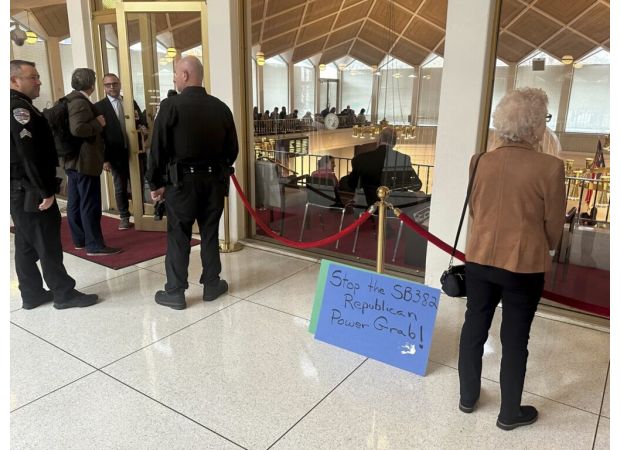Election Day is over but some states are still trying to undermine the outcome through legislative actions.
Some areas are still finding out about election results even though it's been a month since the election.

As the dust settles on the November election, voters in certain parts of the country are realizing that their voices may not have the final say in the political landscape. In states like North Carolina, Missouri, and Massachusetts, lawmakers are taking steps to alter or even nullify certain election results.
In North Carolina, where Democrats were able to break the Republican supermajority and elect Democrats to several statewide offices, Republican lawmakers are pushing through a series of changes in a lame-duck session. These changes include stripping the incoming Democratic governor of certain powers and shifting control of the state election board to the state auditor, who is a Republican. The governor has already vetoed the bill, but the Republicans in the state Senate overrode it and the House vote is expected this week.
This move has sparked protests from citizens who feel that their votes have been undermined and their desire for change has been betrayed. Reverend Rob Stephens, an organizer with the Repairers of the Breach and the Poor People's Campaign, called the process a "betrayal of democracy."
Similarly, in Missouri, where voters approved a constitutional amendment protecting abortion rights, a Republican state senator has introduced a new amendment that would restrict access to abortion except in cases of medical emergency. This is seen as a direct challenge to the will of the voters.
In Massachusetts, where voters overwhelmingly supported giving the state auditor more authority to audit the legislature, Democratic lawmakers are now claiming that this vote violates the separation of powers. They have already made changes to the process of seeking an independent financial audit, which the state auditor believes will weaken the measure and give lawmakers more control over any review.
These actions by some state legislatures following the election are not new. In recent years, there has been a trend of lawmakers trying to counter or slow down the implementation of voter-approved ballot initiatives. This can range from outright reversals to delaying the allocation of funds for certain measures. According to Anne Whitesell, an assistant professor of political science, this is a tactic commonly used by some Republican governors and lawmakers after voters in their states approved expanding Medicaid coverage.
This pattern of disregarding the will of the voters has been criticized as undemocratic by many. Patrick Williamson, general counsel with the Fair Elections Center, points out that over 5.7 million North Carolina voters cast their ballots with the understanding of what powers their elected officials would have. He also notes that this goes against the actions of voters in 2018, when they rejected a proposed constitutional amendment that aimed to limit the governor's authorities surrounding the elections board.
It is clear that the actions taken by some legislatures after the November election are causing concern and sparking debate about the state of democracy in the country. While the election may be over, the battle for power and control continues.
After the dust had settled from the November election, it became clear that for some voters, their voice at the ballot box was not the final say. In several states, lawmakers have already begun to make moves to alter or nullify certain election results. These actions, which have been criticized as undemocratic, are part of a larger pattern that has been growing in recent years.
Anne Whitesell, an assistant professor of political science at Miami University in Ohio, pointed out that when voters cast their ballots, they are not thinking about the possibility of their decision being overturned or ignored. But unfortunately, that is exactly what has been happening. Some lawmakers have been using various tactics, from outright reversals to delaying the implementation of voter-approved initiatives, to undermine the will of the people.
One example of this can be seen in North Carolina, where the legislature has been working to counter the results of the election. Despite losing their supermajority, Republican lawmakers in a lame-duck session passed a series of changes that would limit the powers of the incoming Democratic governor and other elected officials. These changes, including giving control of the state election board to a Republican, have been met with protests and described as a "betrayal of democracy."
Patrick Williamson, general counsel with the Fair Elections Center, a Washington D.C.-based election reform group, noted that over 5.7 million North Carolinians voted for the officials they wanted, with the understanding of what powers those officials would have. The recent actions by the legislature go against what voters expected when they cast their ballots.
In Missouri, a similar situation has unfolded after voters approved a constitutional amendment protecting abortion rights. In response, a Republican state senator introduced a new amendment that would restrict access to abortion. Similarly, in Massachusetts, where voters overwhelmingly approved giving the state auditor the power to audit the legislature, Democrats in control of both chambers have raised concerns about the separation of powers and have taken steps to weaken the measure.
These actions by lawmakers after the November election are not isolated incidents, but rather part of a larger trend. It raises questions about the true power of the people's vote and the ability of elected officials to respect and uphold the decisions made by their constituents. As we move forward, it is important to continue to monitor and hold accountable those in positions of power, ensuring that the voices of the people are not silenced or disregarded.




